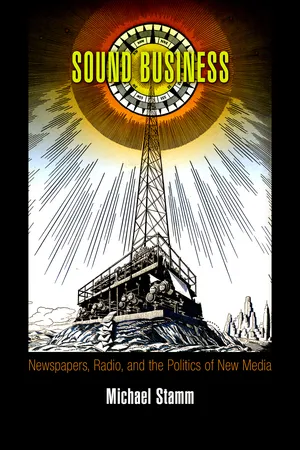
- 264 pages
- English
- ePUB (mobile friendly)
- Available on iOS & Android
About This Book
American newspapers have faced competition from new media for over ninety years. Today digital media challenge the printed word. In the 1920s, broadcast radio was the threatening upstart. At the time, newspaper publishers of all sizes turned threat into opportunity by establishing their own stations. Many, such as the Chicago Tribune 's WGN, are still in operation. By 1940 newspapers owned 30 percent of America's radio stations. This new type of enterprise, the multimedia corporation, troubled those who feared its power to control the flow of news and information. In Sound Business, historian Michael Stamm traces how these corporations and their critics reshaped the ways Americans received the news.Stamm is attuned to a neglected aspect of U.S. media history: the role newspaper owners played in communications from the dawn of radio to the rise of television. Drawing on a wide array of primary sources, he recounts the controversies surrounding joint newspaper and radio operations. These companies capitalized on synergies between print and broadcast production. As their advertising revenue grew, so did concern over their concentrated influence. Federal policymakers, especially during the New Deal, responded to widespread concerns about the consequences of media consolidation by seeking to limit and even ban cross ownership. The debates between corporations, policymakers, and critics over how to regulate these new kinds of media businesses ultimately structured the channels of information distribution in the United States and determined who would control the institutions undergirding American society and politics. Sound Business is a timely examination of the connections between media ownership, content, and distribution, one that both expands our understanding of mid-twentieth-century America and offers lessons for the digital age.
Frequently asked questions
Information
Table of contents
- Cover
- Title
- Copyright
- Contents
- Introduction
- 1. Power, Politics, and the Promise of New Media
- 2. New Empires
- 3. Reshaping the Public Sphere
- 4. Reform Liberalism and the Media
- 5. Media Corporations and the Critical Public
- Conclusion: The Persistence of Print
- Appendix
- List of Archival Abbreviations and Acronyms
- Notes
- Index
- Acknowledgments